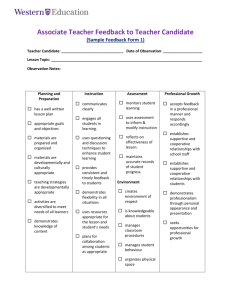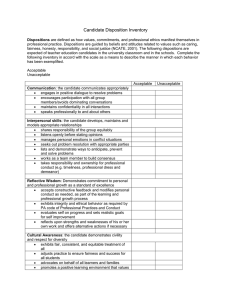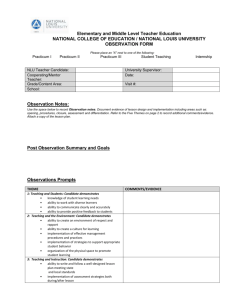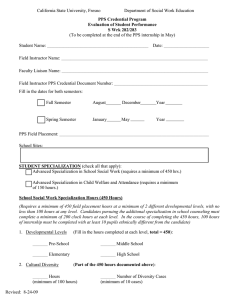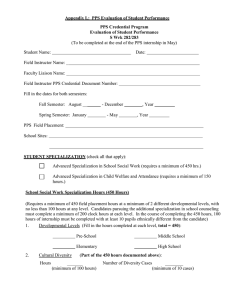School Social Work and Child Welfare and Attendance Semester: Spring ____
advertisement
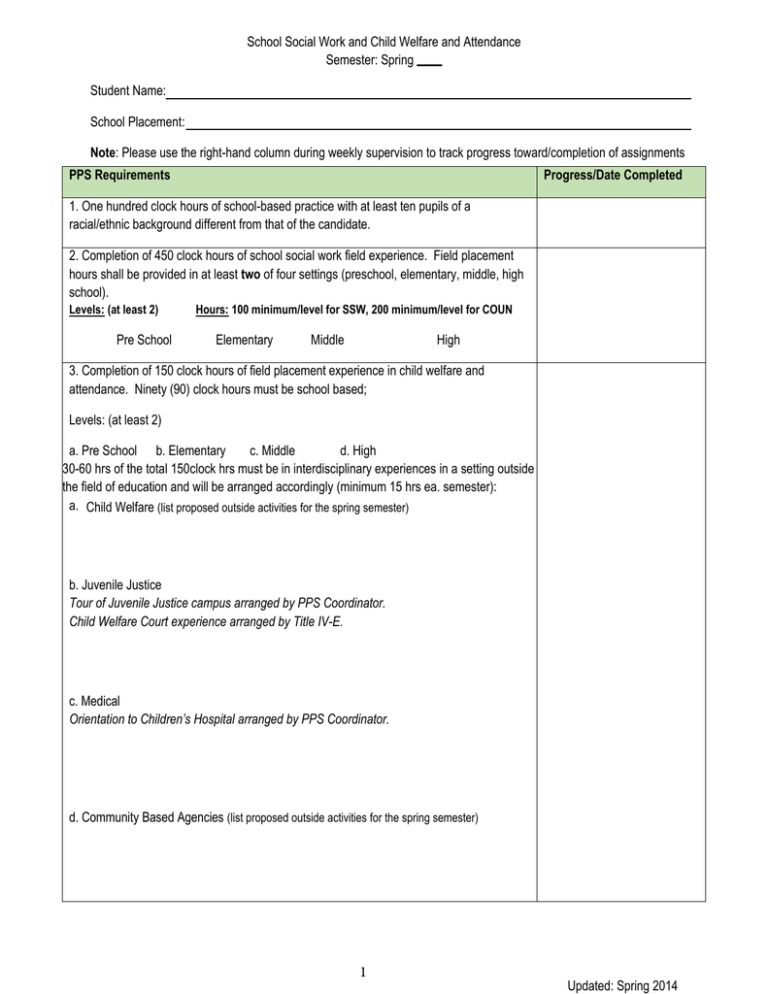
School Social Work and Child Welfare and Attendance Semester: Spring ____ Student Name: School Placement: Note: Please use the right-hand column during weekly supervision to track progress toward/completion of assignments PPS Requirements Progress/Date Completed 1. One hundred clock hours of school-based practice with at least ten pupils of a racial/ethnic background different from that of the candidate. 2. Completion of 450 clock hours of school social work field experience. Field placement hours shall be provided in at least two of four settings (preschool, elementary, middle, high school). Levels: (at least 2) Pre School Hours: 100 minimum/level for SSW, 200 minimum/level for COUN Elementary Middle High 3. Completion of 150 clock hours of field placement experience in child welfare and attendance. Ninety (90) clock hours must be school based; Levels: (at least 2) a. Pre School b. Elementary c. Middle d. High 30-60 hrs of the total 150clock hrs must be in interdisciplinary experiences in a setting outside the field of education and will be arranged accordingly (minimum 15 hrs ea. semester): a. Child Welfare (list proposed outside activities for the spring semester) b. Juvenile Justice Tour of Juvenile Justice campus arranged by PPS Coordinator. Child Welfare Court experience arranged by Title IV-E. c. Medical Orientation to Children’s Hospital arranged by PPS Coordinator. d. Community Based Agencies (list proposed outside activities for the spring semester) 1 Updated: Spring 2014 Instructions: For each required program competency, the student lists assignment(s) to be completed in order to fulfill the competency. This addendum is to be attached to the required graduate learning agreement for each semester of this academic year. PPS Competencies Progress/Date Completed 1. Candidate demonstrates socio-cultural competence in practice at all systems levels, including assessment, intervention planning, service delivery, communication, and mediation of cultural conflicts in an effort to develop a positive, supportive learning environment that is culturally congruent with the needs of pupils and families. a. b. c. 2. Candidate demonstrates understanding of the importance of school organizational and educational policies and procedures as they relate to effective classroom management, positive adult-pupil relationships, pupil advocacy, effective approaches to discipline, and the development of personal and social responsibility and self-esteem. a. b. c. 3. Candidate demonstrates skill in the interpretation and application of laws and pupil/parent rights which influence education and attendance, including attendance, child labor, child custody, and child abuse reporting. a. b. c. 2 Updated: Spring 2014 4. Candidate demonstrates skill in developing collaborative working relationships with school staff and other professionals within the school such as counselors, psychologists, and nurses. a. b. c. 5. Candidate demonstrates ability to use communication and facilitation skills, collaborative and team building skills, and consultation skills in cases, classrooms, schools, districts and community systems of care such as health, mental health, child welfare and juvenile justice to maximize positive outcomes for pupils, schools, families and communities. a. b. c. 6. Candidate demonstrates skills in conducting appropriate biopsychosocial assessments of pupils and families, including identification of school and community factors that inhibit learning progress and use this information to develop programs and activities to promote pupil success. a. b. c. 3 Updated: Spring 2014 7. Candidate demonstrates skill in implementing effective prevention and intervention strategies, developing programs, and utilizing community resources. a. b. c. 8. Candidate demonstrates skill in interpreting pupil’s development, educational status and potential to families with the specific purpose of enhancing families’ understanding and utilization of available school and community resources. a. b. c. 9. Candidate demonstrates ability to participate in planning, prevention and intervention to promote pupil well-being and safety and reduce the incidence of school site violence. a. b. c. 10. Candidate demonstrates skill in assessment and intervention with attendance problems and the appropriate use of alternatives to regular school attendance. a. b. 4 Updated: Spring 2014 c. 11. Candidate demonstrates knowledge of learning theories and factors influencing learning and utilizes effective strategies and techniques to assist students in developing responsibility for their own learning. a. b. c. Signatures: __________________________________________________________________________________________________________________ STUDENT SIGNATURE DATE __________________________________________________________________________________________________________________ M.S.W./PPS FIELD INSTRUCTOR SIGNATURE DATE __________________________________________________________________________________________________________________ PPS FACULTY LIAISON SIGNATURE DATE __________________________________________________________________________________________________________________ PPS COORDINATOR SIGNATURE DATE 5 Updated: Spring 2014
